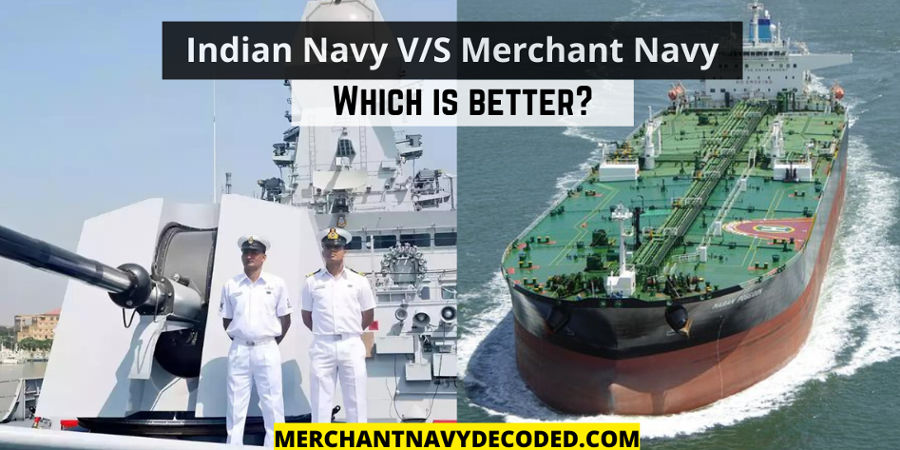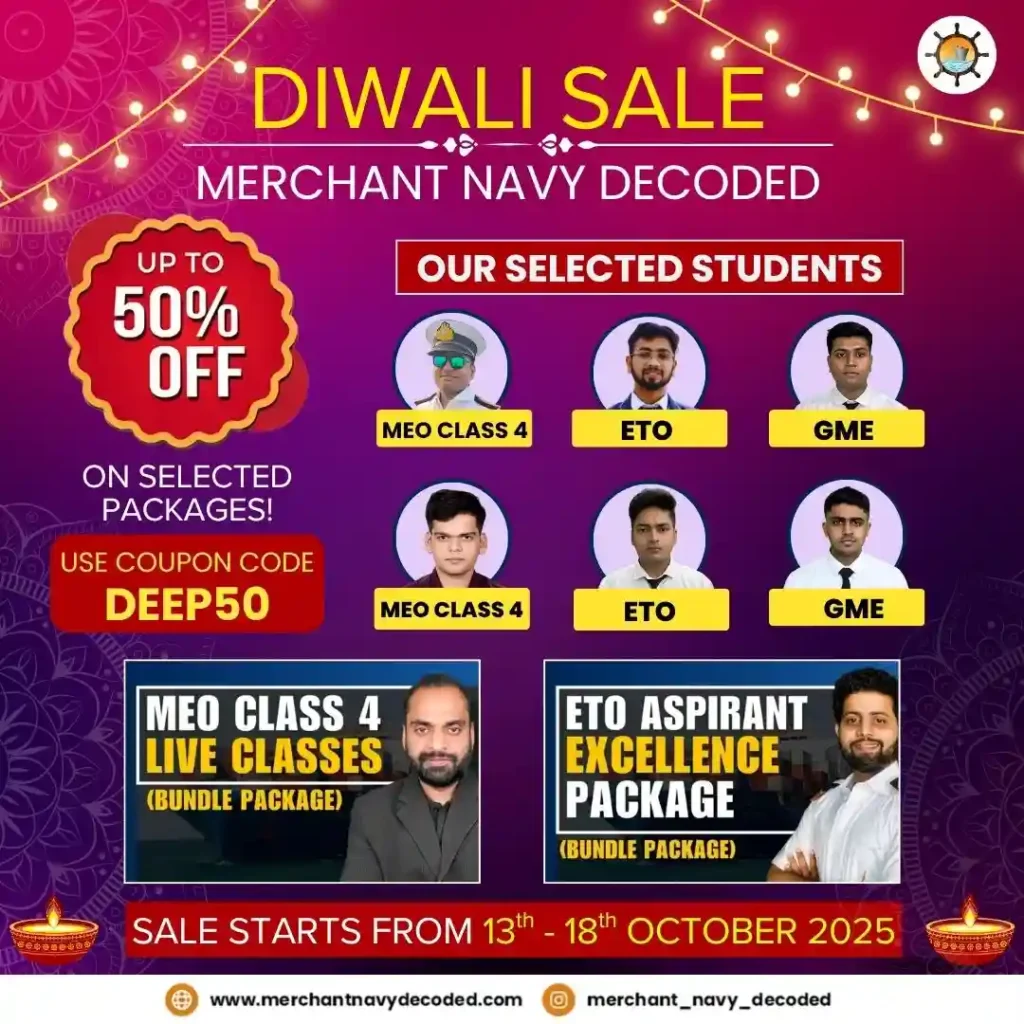Indian Navy V/s Merchant Navy – Which is better?
As someone who has had the privilege of being associated with both the Merchant Navy and the Indian Navy, I often find myself in a predicament when asked about my profession. People often mistake the two and assume that they are the same, which is far from the truth. In this blog, I will attempt to compare and contrast the two and provide insights into the advantages and disadvantages of each.
Private vs Government Sector

To begin with, the Merchant Navy and the Indian Navy are two distinct sectors that serve different purposes. While the Merchant Navy is a private sector involved in import/export, the Indian Navy is a government sector responsible for protecting the country from external threats. While money is a significant factor for many who join the Merchant Navy, joining the Indian Navy is more about respect, honour, and the desire to serve one’s country.
Courses for Joining

| Merchant Navy | Indian Navy |
| Deck Officer – DNS & BSC in Nautical Science | Join NDA for 3 years |
| Engine Officer – BTech in Marine Engineering, GME & DME | After that, you go to Kerala for 1 year |
| Electrical Officer – B.Tech in Electrical or B.Tech in Electrical Communication | Total 4 years of training |
| For GP Rating – Do it after 10th |
The courses required for joining the two sectors also differ. To become a deck officer in the Merchant Navy, one can pursue DNS and BSC Nautical Science courses and for engine officers, one can do B. Tech Marine Engineering, GME, or DME courses. For ETO, one can pursue a B.Tech in Electrical or B.Tech in Electrical Communication. For GP rating, one can join after completing 10th standard. On the other hand, for the Indian Navy, one has to undergo a three-year course after NDA and then a one-year course at Kerala.
Promotion and Salary

The promotion and salary structures also differ greatly between the two sectors. After completing the necessary courses and exams, one becomes a 3rd officer in the Merchant Navy with a salary of around 1.5 lakhs per month. However, in the Indian Navy, one starts as a lieutenant with a salary of 70-80 thousand per month. After around 10-12 years in the Merchant Navy, one can become a captain with a salary of around 8-10 lakhs per month. In the Indian Navy, it takes around 25 years of service to become the chief of army staff, with a salary of around 2-2.5 lakhs per month. While there is a significant difference in terms of salary between the two sectors, it is important to consider the challenges that each sector presents.
Challenges and Opportunities

The Merchant Navy has around 50,000 ships, and each ship requires a chief engineer and a captain, which means that the chances of success are high. Moreover, one can earn money, status, and property in the Merchant Navy. In contrast, the competition in the Indian Navy is fierce, and only the best of the best become the chief of army staff. It is a significant achievement that demands hard work, dedication, and passion.
Advantages and Disadvantages of Joining Merchant Navy

If you are looking to join the Merchant Navy, there are several advantages to consider. First and foremost, the money is good, and you get to travel to different parts of the world. You can also plan your holidays according to your schedule, and when you are home, you can spend time with your family. However, there are also several disadvantages to consider. For instance, port durations are often short, and you may not get the opportunity to get off the ship. You also have to stay away from your family for extended periods, which can be difficult. Additionally, life onboard a ship can be adventurous and unpredictable, with each day bringing a new challenge.
Advantages and Disadvantages of Joining the Indian Navy

On the other hand, if you are looking to join the Indian Navy, you should do so out of a sense of pride and honour for your country. You will be part of a team that protects the nation from external threats, and you will have the opportunity to serve your country. However, joining the Indian Navy comes with its own set of challenges. For instance, you will have to make sacrifices and may not be able to communicate with your family regularly. There is always a risk to life and you hardly get any holidays.
Competition

Merchant Navy is a popular career option among students who want to make a career in the maritime industry. Every year, around 50,000 students appear for the entrance exam, out of which only 4-5% of candidates get selected in good colleges for courses like DNS, BSc, and Btech Marine, and then they become Merchant Navy officers.
On the other hand, Indian Navy is one of the most prestigious organizations in India. Every year, around 800,000 students appear for the NDA exam, out of which only around 10,000 clear the written exam. Those 10,000 students are then called for the Service Selection Board (SSB), where their interview skills, personality, psychology, and presentation skills are tested. After the SSB, only 500 candidates are selected out of 10,000. Finally, there is a very difficult medical test, where everything is checked, and only 400 candidates are selected. The chances of getting selected for the Indian Navy are just 0.05%. Therefore, it is essential to have a strong passion for this field. The competition is tough, and the selection process is rigorous.
How to Prepare for Merchant Navy?

Online Test – IMUCET:
The Merchant Navy requires candidates to clear an online test called IMUCET. The syllabus for the test is based on the +2 NCERT syllabus, which means one should have a good understanding of Physics, Chemistry, and Mathematics. Therefore, it is essential to have a strong foundation in these subjects to crack the IMUCET exam.
Good Communication Skills:
Communication skills play a vital role in the Merchant Navy. It is a profession that involves working with people from different cultures and nationalities. Therefore, having good communication skills is essential to interact with people effectively. Candidates must have a good command of the English language, both written and verbal.
Psychometric Test:
Candidates are also required to give a psychometric test, which helps to assess their personality traits and cognitive abilities. The test is designed to understand the candidate’s suitability for the job and their mental and emotional stability.
Medical Test :
A medical examination is mandatory for all candidates who wish to join the Merchant Navy. Candidates must meet the physical fitness criteria, and their eyesight should be 6/6 to avoid any medical issues while at sea.
How to prepare for Indian Navy?

Offline Test:
The Indian Navy conducts an offline test for recruitment, which includes questions from Physics, Chemistry, and Mathematics. Candidates who have studied these subjects in their 12th grade are eligible to apply for the test.
SSB – GD, Interview, and Psychometric Test:
Candidates who clear the written test are called for the SSB interview, which includes a group discussion, personal interview, and psychometric test. The test is designed to assess the candidate’s mental, emotional, and psychological stability, leadership qualities, and overall suitability for the job.
Medical Test:
Candidates who clear the SSB interview must also pass a medical examination. Candidates should be medically fit, and their eyesight should be 6/6. Any medical issue that may arise during their service on the ship will hamper their performance and affect their colleagues’ safety.
Which one is better?

Some may argue that they should not be compared, while others may say that both have their own strengths. However, if I have to make a choice, I would choose the Indian Navy.
Disclaimer :- The opinions expressed in this article belong solely to the author and may not necessarily reflect those of Merchant Navy Decoded. We cannot guarantee the accuracy of the information provided and disclaim any responsibility for it. Data and visuals used are sourced from publicly available information and may not be authenticated by any regulatory body. Reviews and comments appearing on our blogs represent the opinions of individuals and do not necessarily reflect the views of Merchant Navy Decoded. We are not responsible for any loss or damage resulting from reliance on these reviews or comments.
Reproduction, copying, sharing, or use of the article or images in any form is strictly prohibited without prior permission from both the author and Merchant Navy Decoded.



I sanjana sharma, a Deck officer since from 2012 serving in Merchant Navy ships. Best part of my life is free travelling around the world which my dreams come through Merchant Navy. All courses i had done in NAVAL MARITIME ACADEMY (NAMAC), Mumbai with “A1 Grade”
Need to know the procedure from starting
Hi mam , I would like to join in merchant Navy but I have a dout on my future family life is there any problem will happen for the family time ? Plz talk about your experience mam it’s a request
You have told us in the blog about deciding your future in Merchant Navy. Thank you for this blog.
You can join our institute to make your future in Merchant Navy, for more details click on the link given below.
https://sanskamaritime.org/
From when i want to start preparing for merchant navy
If you want to start preparing for merchant navy then first thing you should do is check which course you are eligible for with our Merchant Navy Eligibility Calculator and then enroll in our free How to Join Merchant Navy Guidance Series to get the complete information about the course you are eligible for.
Marchant navy internatnal
Hi Nabajit, can you explain your doubt in brief.
Marchant navy
can anyone join merchant navy after doing commerce
Hello Vishali.
For all your Merchant Navy doubts? One solution — the Merchant Navy Start App!
Whether it’s about the joining process, medicals, courses, or sponsorship updates — you’ll find everything in one place.
Download Now – https://play.google.com/store/apps/details?id=com.merchantnavystart.app
Team Merchant Navy Decoded